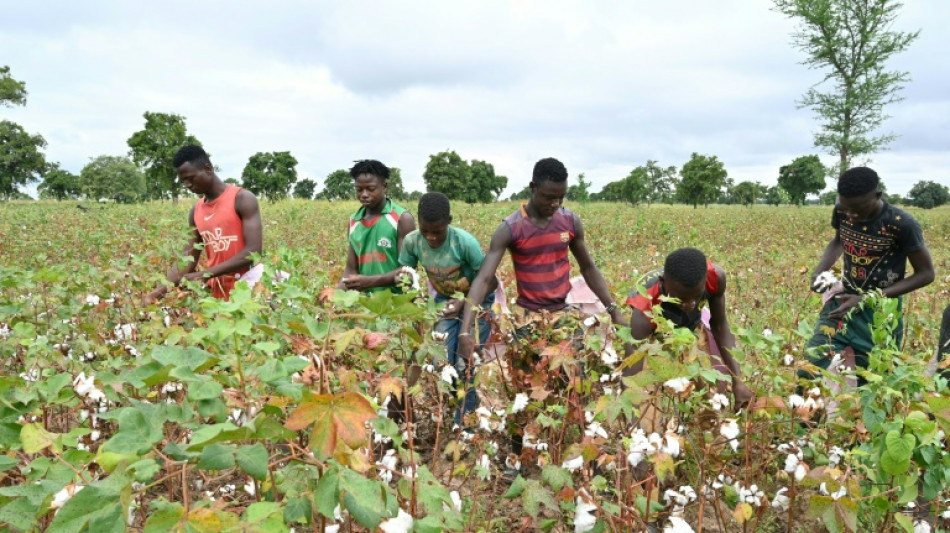
-
 Paw patrol: Larry the cat marks 15 years at 10 Downing Street
Paw patrol: Larry the cat marks 15 years at 10 Downing Street
-
India plans AI 'data city' on staggering scale
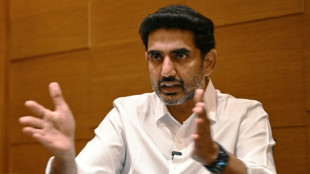
-
 Jamaica's Thompson-Herah runs first race since 2024
Jamaica's Thompson-Herah runs first race since 2024
-
Top seed Fritz to face Shelton for ATP Dallas Open title

-
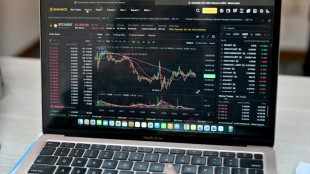 Crash course: Vietnam's crypto boom goes bust
Crash course: Vietnam's crypto boom goes bust
-
Ahead of Oscars, Juliette Binoche hails strength of Cannes winners

-
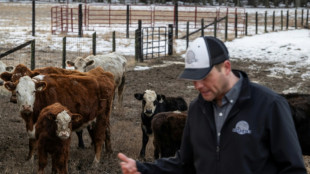 US cattle farmers caught between high costs and weary consumers
US cattle farmers caught between high costs and weary consumers
-
New York creatives squeezed out by high cost of living

-
 Lillard matches NBA 3-point contest mark in injury return
Lillard matches NBA 3-point contest mark in injury return
-
NBA mulling 'every possible remedy' as 'tanking' worsens

-
 Team USA men see off dogged Denmark in Olympic ice hockey
Team USA men see off dogged Denmark in Olympic ice hockey
-
'US-versus-World' All-Star Game divides NBA players

-
 Top seed Fritz beats Cilic to reach ATP Dallas Open final
Top seed Fritz beats Cilic to reach ATP Dallas Open final
-
China's freeski star Gu recovers from crash to soar into Olympic big air final

-
 Braathen wins unique Winter Olympic gold for Brazil, Gu overcomes scare
Braathen wins unique Winter Olympic gold for Brazil, Gu overcomes scare
-
Lens run riot to reclaim top spot in Ligue 1, Marseille slip up

-
 Last-gasp Zielinski effort keeps Inter at Serie A summit
Last-gasp Zielinski effort keeps Inter at Serie A summit
-
Vinicius bags brace as Real Madrid take Liga lead, end Sociedad run

-
 Liverpool beat Brighton, Man City oust Beckham's Salford from FA Cup
Liverpool beat Brighton, Man City oust Beckham's Salford from FA Cup
-
International crew arrives at space station

-
 Australia celebrate best-ever Winter Olympics after Anthony wins dual moguls
Australia celebrate best-ever Winter Olympics after Anthony wins dual moguls
-
Townsend becomes a fan again as Scotland stun England in Six Nations

-
 France's Macron urges calm after right-wing youth fatally beaten
France's Macron urges calm after right-wing youth fatally beaten
-
China's freeski star Gu recovers from crash to reach Olympic big air final

-
 Charli XCX 'honoured' to be at 'political' Berlin Film Festival
Charli XCX 'honoured' to be at 'political' Berlin Film Festival
-
Relatives of Venezuela political prisoners begin hunger strike
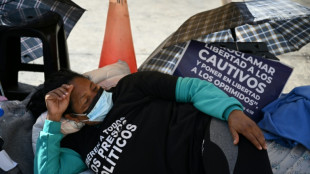
-
 Trump's 'desire' to own Greenland persists: Danish PM
Trump's 'desire' to own Greenland persists: Danish PM
-
European debate over nuclear weapons gains pace

-
 Newcastle oust 10-man Villa from FA Cup, Man City beat Beckham's Salford
Newcastle oust 10-man Villa from FA Cup, Man City beat Beckham's Salford
-
Auger-Aliassime swats aside Bublik to power into Rotterdam final

-
 French prosecutors announce special team for Epstein files
French prosecutors announce special team for Epstein files
-
Tuipulotu 'beyond proud' as Scotland stun England

-
 Jones strikes twice as Scotland end England's unbeaten run in style
Jones strikes twice as Scotland end England's unbeaten run in style
-
American Stolz wins second Olympic gold in speed skating

-
 Marseille start life after De Zerbi with Strasbourg draw
Marseille start life after De Zerbi with Strasbourg draw
-
ECB to extend euro backstop to boost currency's global role

-
 Canada warned after 'F-bomb' Olympics curling exchange with Sweden
Canada warned after 'F-bomb' Olympics curling exchange with Sweden
-
Ultra-wealthy behaving badly in surreal Berlin premiere

-
 250,000 at rally in Germany demand 'game over' for Iran's leaders
250,000 at rally in Germany demand 'game over' for Iran's leaders
-
UK to deploy aircraft carrier group to Arctic this year: PM

-
 Zelensky labels Putin a 'slave to war'
Zelensky labels Putin a 'slave to war'
-
Resurgent Muchova beats Mboko in Qatar final to end title drought

-
 Russia's Navalny poisoned with dart frog toxin: European states
Russia's Navalny poisoned with dart frog toxin: European states
-
Farrell hails Ireland's 'unbelievable character' in edgy Six Nations win

-
 Markram, Jansen lead South Africa to brink of T20 Super Eights
Markram, Jansen lead South Africa to brink of T20 Super Eights
-
Guehi scores first Man City goal to kill off Salford, Burnley stunned in FA Cup

-
 Swiss say Oman to host US-Iran talks in Geneva next week
Swiss say Oman to host US-Iran talks in Geneva next week
-
Kane brace helps Bayern widen gap atop Bundesliga

-
 Ireland hold their nerve to beat gallant Italy in Six Nations thriller
Ireland hold their nerve to beat gallant Italy in Six Nations thriller
-
European states say Navalny poisoned with dart frog toxin in Russian prison


France plans fashion revolution with climate-impact labels
Is it better for the environment if you buy a brand-new cotton T-shirt or a recycled one?
Well, it depends.
Recycling has obvious benefits, but the process shortens cotton fibres and so usually has to be mixed with some oil-based material to keep it from falling apart.
Such trade-offs make it tricky to figure out the real sustainability rating of clothes -- but brands in Europe will soon have no choice.
By next year, every item of clothing sold in France will require a label detailing its precise climate impact -- with a similar rule expected for the rest of the European Union by 2026.
That means juggling many different and conflicting data points: Where and how were its raw materials grown? What was used to colour it? How far did it travel? Was the factory powered with solar energy or coal?
The French Agency for Ecological Transition (Ademe) is currently testing 11 proposals for how to collect and compare data -- and what the resulting label might look like to consumers -- using 500 real-life items of clothing.
"The message of the law is clear -- it will become obligatory, so brands need to prepare, to make their products traceable, to organise the automatic collection of data," Erwan Autret, one of the coordinators at Ademe, told AFP.
"Some say the models are too simple, some say they're too complicated, but it's a sign of the maturity of the debate that no one questions the need for these calculations anymore."
- 'Transparent and informed' -
The need for change in fashion is urgent.
Statistics are notoriously hard to verify, but the UN says the industry is responsible for 10 percent of global carbon emissions, as well as a significant portion of water consumption and waste.
Labels can be a key part of the solution, say campaigners.
"It will force brands to be more transparent and informed... to collect data and create long-term relationships with their suppliers -- all things they're not used to doing," said Victoire Sotto, of The Good Goods, a fashion and sustainability consultancy.
"Right now it seems infinitely complex," she added. "But we've seen it applied in other industries such as medical supplies."
Seeing how the winds are blowing, the textile industry has been racing to come up with technical solutions.
A recent presentation by Premiere Vision, a Paris-based textiles conference, highlighted many new processes including non-toxic leather tanning, dyes drawn from fruits and waste -- and even biodegradable underwear that can be thrown on the compost.
But the key to sustainability is using the right fabric for the right garment, said Ariane Bigot, Premiere Vision's deputy head of fashion.
That means synthetic and oil-based fabrics will still have a place, she said: "A strong synthetic with a very long lifespan might be right for some uses, such as an over-garment that needs little washing."
Capturing all these trade-offs in one simple label on an item of clothing is therefore tricky.
"It's very complicated," said Bigot. "But we need to get the machine started."
- Sustainable options -
The French agency is due to collate the results of its testing phase by next spring before handing the results to lawmakers.
While many welcome the labels, activists say this should only be part of a wider crackdown on the fashion industry.
"It's really good to put an emphasis on life-cycle analysis but we need to do something about it beyond just labels," said Valeria Botta, of the Environmental Coalition on Standards.
"The focus should be on setting clear rules on product design to ban the worst products from the market, ban the destruction of returned and unsold goods, and set production limits," she told AFP.
"Consumers should not have to fight to find a sustainable option -- that should be the default."
D.AbuRida--SF-PST

